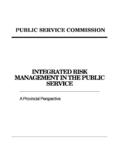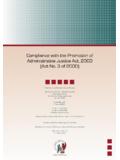Transcription of IMPROVING ACCOUNTABILITY AND TRANSPARENCY IN THE …
1 1 IMPROVING ACCOUNTABILITY AND TRANSPARENCY IN THE PUBLIC SECTOR BY EXAMINING HOW TO DEPOLITICISE EXECUTIVE GOVERNANCE, INCLUDING PROFESSIONALISATION OF THE PUBLIC SECTOR, STATE OWNED ENTERPRISES AND PUBLIC PROCUREMENT INPUT BY RICHARD SIZANI THE CHAIRPERSON OF THE PUBLIC SERVICE COMMISSION TO PUBLIC AFFAIRS RESEARCH INSTITUTE ROUNDTABLE DISCUSSION 10 APRIL 2018 JOHANNESBURG Professor Ivor Chipkin, the Executive Director of PARI The PARI team, in particular Ms Baaitse Nethononda, the Programme Co-ordinator Dr M Buthelezi, Research Manager at PARI Members of the Public Sector Network, especially current and former DGs in our Public Service Dr D Mamphiswana, Director-General of the Public Service Commission and senior officials Delegates from civil society, government and the private sector Distinguished guests Ladies and Gentlemen All protocol observed INTRODUCTION 1.
2 It is a pleasure and honour for me to be asked to speak at this Public Service Reform Roundtable Series. I would like to thank Professor Ivor Chipkin and the PARI team for inviting me to this event to address you on issues related to the improvement of TRANSPARENCY and ACCOUNTABILITY in the Public Service by exploring how to depoliticise Executive Governance within the public sector, including how to professionalise the public service, State Owned Enterprises, and public procurement. 2. I would like to extend my condolences to the Mandela and Madikizela families for the loss of Ms Nomzamo Winifred Madikizela Mandela a freedom fighter par excellence.
3 We would also wish to remember Mr Chris Thembisile Hani on the 25th anniversary of his death. We hope that their sacrifices will not be in vain. 3. Before I talk to the topic, I would like to congratulate PARI on its research on various drivers of institutional performance in the public sector. The Public Service 2 Commission has noted that many of your reports, papers and articles address critical contemporary issues that are of public interest. Publications on State Capture and Revolution in Contemporary South Africa , the Machinery of Government Change in South Africa s Post-democratic Public Administration and How will SA tackle corruption?
4 , to name but a few, certainly captured our interest. 4. The PSC has also noted PARI s role in the area of public service leadership at the Head of Department-level, especially the establishment of the Public Sector Network, a strategic dialogue group. In this regard, the PSC, together with the DPSA, DPME and the National School of Government are having discussions to utlise the expertise of former Directors General (DGs) and other senior managers. I have had an opportunity to read the Public Sector Network proposals on public service reform. I have found them to be quite profound.
5 I would therefore support probably about 90% of them, with a few quibbles on the last 10%. 5. As our organisations clearly share some interests relating to the Public Service, the PSC is interested in entering into a Memorandum of Understanding with PARI to share our resources and expertise. 6. The PSC is established in terms of Chapter 10 of the South African Constitution of 19961. We are established as an independent, impartial body that must exercise its powers and perform its functions without fear, favour or prejudice in the interest of the maintenance of effective and efficient public administration and a high standard of professional ethics in the public service2.
6 WHAT IS MEANT BY ACCOUNTABILITY AND TRANSPARENCY IN THE PUBLIC SERVICE? 7. ACCOUNTABILITY refers to the obligation of public servants or an institution to account for their activities, provide information about decisions and actions, explain and justify decisions, accept responsibility for them, and to disclose the results in a transparent manner. Through ACCOUNTABILITY , public servants are expected to be answerable for their actions, and most importantly that there should be consequences when duties and commitments are not met3.
7 8. TRANSPARENCY includes providing information to the public on request and information not requested by the public but which will be to the benefit of the public. A public body ( department) is not necessarily transparent when it is 1 Constitution of the Republic of South Africa, 1996 2 Section 196 of the Constitution of the Republic of South Africa. 3 Public Service Commission. Internal documents on CVP Pilot project. 2017. 3 effective and fast in answering requests for information but not providing information upfront on the public body such as who is in charge, and the specific services provided4.
8 DEPOLITICISATION OF EXECUTIVE GOVERNANCE, INCLUDING PROFESSIONALISATION OF THE PUBLIC SECTOR, STATE OWNED ENTERPRISES AND PUBLIC PROCUREMENT Managing Political Administrative Interface 9. A persistent dilemma in modern democratic systems has been the tension concerning the boundaries of the roles of elected politicians and the professional administrators in public policy. There is a continuum of views about resolving this tension, with one extreme advocating for the absolute control of a neutral and professional bureaucracy by the elected politicians and the other extreme contending that to the victor go the spoils with huge shifts in the senior civil service after a transition of power5.
9 10. Managing political and professional relations at the apex of government is a delicate process which requires an adequate regulatory framework that would define roles and responsibilities and outline the operational context within which these must be discharged. Those operating at this level need to have the necessary maturity to ensure that human relations are not an impediment in discharging the defined roles and responsibilities. 11. According to Thornhill (2005) politicians make political choices, however, these choices have to be considered within the framework of its administrative, managerial and technical feasibility , which is the domain of public officials appointed as a result of their expertise6.
10 12. Miller and McTavis (2009) define the relationship at the apex of government as the the intersection of leadership roles tradition of dichotomous relationship between political and administrative realms 7. From these definitions it is clear that there has to be limitations on the role of politicians in order to create sufficient space for administration to run a professional public administration system. 4 Ibid. 5 United Nations. (Department of Economic and Social Affairs) 11th International Anti-Corruption Conference workshop report.














